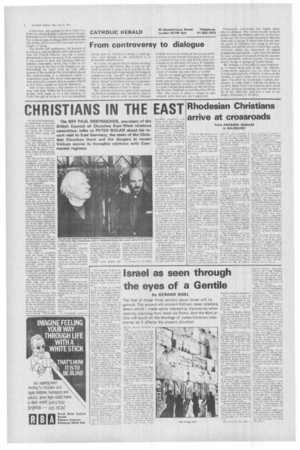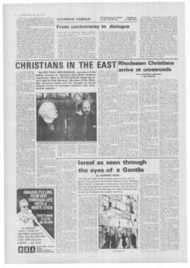Page 4, 14th June 1974
Page 4

Report an error
Noticed an error on this page?If you've noticed an error in this article please click here to report it.
Tags
Share
Related articles
A Thaw In East Germaily
Christian Dialogue With Marxists
Marxist Talks 'more Relevant'
Catholics Take The Lead
Archbishop Romero Champion Of The Poor In Spirit And Body
CHRISTIANS IN THE EAST
The REV PAUL OESTREICHER, secretary of the British Council of Churches East-West relations committee, talks to PETER NOLAN about his recent visit to East Germany, the state of the Christian Churches there and the dangers in recent Vatican moves to formalise relations with Communist regimes.
The Rev Paul Oestreicher, just back from a visit to East Germany with Dr Ramsey, Archbishop of Canterbury, has found the Christian Church there young and confident.
Mr Oestreicher was himself born in Meiningen in East Germany and translated for the Archbishop. Secretary of the British Council of Churches' East-West Relations Cornmittee, he has a wide knowledge of the Church in Eastern Europe.
Mr Oestreicher said distinguished East German theologians had done more thinking on the problems of the Church in a secular society than had been done in the West, where their work was virtually unknown. The leadership was generally young, with bishops in their early forties, and people had a lot of confidence in the younger generation.
"The Church in East Germany is reduced to its real level, the fellow-travellers have left and it has been stripped down to real Christians," he said. The Catholic Church is small in East Germany, numbering about seven per cent of the population, but Mr Oestreicher said it was a very united community.
During his six-day visit, the Archbishop of Canterbury had called on Cardinal Bensch, leader of East Germany's Catholics. The Archbishop described an ecumenical service at Erfurt's Catholic Cathedral as one of the most moving experiences he had there. People burst into spontaneous applause at the end of the service and it was taken up by those on the street when he came out.
Mr Oestreicher said he thought it showed people identifying themselves as Christians and welcoming the visit, which was returning a previous visit from an East German Church leader to Britain.
One could not generalise about the Church in Eastern Europe, as it differed from country to country and even from region to region within a particular country. said Mr Oestreicher. In Germany Christians had gone through the struggle against Hitler with the Communists, which had helped relations between them, he said.
In East Germany, churchmen were allowed to speak openly, unlike some other countries such as Hungary, he said, though there was a ban on the building of new churches and other restrictions.
Like Czechoslovakia, East Germany was "sociologically in Western Europe," he said, unlike the other agriculturallybased East European countries. He did not think East Germany was any more secularised than its Western opposite numbers, despite the pressures of Communist ideology. "The Church's strength is in reverse proportion to its size." he added.
Marxist-Christian dialogue was officially proscribed, he said. "Co-existence, yes ideological co-existence, never." As secretary of the BCC committee, his own approach was to encourage Communists to live up to their high ideals, he said.
The Communists found it easy to cope with Christians who were anti-Communist just because they were Christians, he said. His own tactics led to him being criticised as a Maoist.
Mr Oestreicher, who is wellknown for his public opposition to Apartheid and championing of other civil rights issues, said: "Anti-Communism is just as dangerous as Communism itself."
. By anti-Communism Mr Oestreicher said he meant Western self-righteousness. In the world's richest country, the United States, a fifth of the population suffered deprivation, he said.
In Communist countries,
production had been raised, a ¢ minimum standard of living had been achieved for all, he said. This average standard was lower than in the West but it was without the pockets of poverty visible in all western countries.
Good health facilities and
education were available to all in Eastern Europe, he said. He added that much of the social protest against Communism came from the former middle classes in Communist countries, who had lost their privileged position.
As secretary of the BCC's East-West committee, with whose work three Catholic priests are involved, he meets and sends religious delegations to Communist countries. The BCC also arranges scholarships for Communist students to study in the West, financed through the World Council of Churches. This work is being currently assisted by Douglas Hyde.
To allow for such exchanges, "minimal concessions" had to be made, he said. But he declared "we are not playing the cold war game." It was part of the BCC's business to promote human rights in Eastern Europe and everywhere else and they had been able to use their contacts to help some individual cases, he said.
Asked what he thought of recent Vatican diplomatic moves towards some form of agreement with East European Governments, he said he viewed the new Vatican approach "with cautious reserve.'
"If they arc made in the spirit of Pope John, as profound, sympathetic attempts to understand the situation" he would welcome them, he said. But if they were part "of the old Vatican policy of maximising its power" even to the point where they would make a pact with devil if it proved necessary, he would be against the moves, "A concordat between the Kremlin and the Vatican would be a tragedy." he said. There was a danger that the Vatican would make some sacrifices to retain the public structure of the Church. even if being allowed to do this meant limiting it, he said. This could lead to a situation similar to that in Hungary, where individual priests did not know if they could trust one another and the Church was "voluntarily gagged."
Mr Oestreicher said we could learn a great deal from Christians under Communism. The rising level of education had also led to a vet) high degree of dissatisfaction being felt among young people in Eastern Europe and he was sure this would lead to changes.
blog comments powered by Disqus











